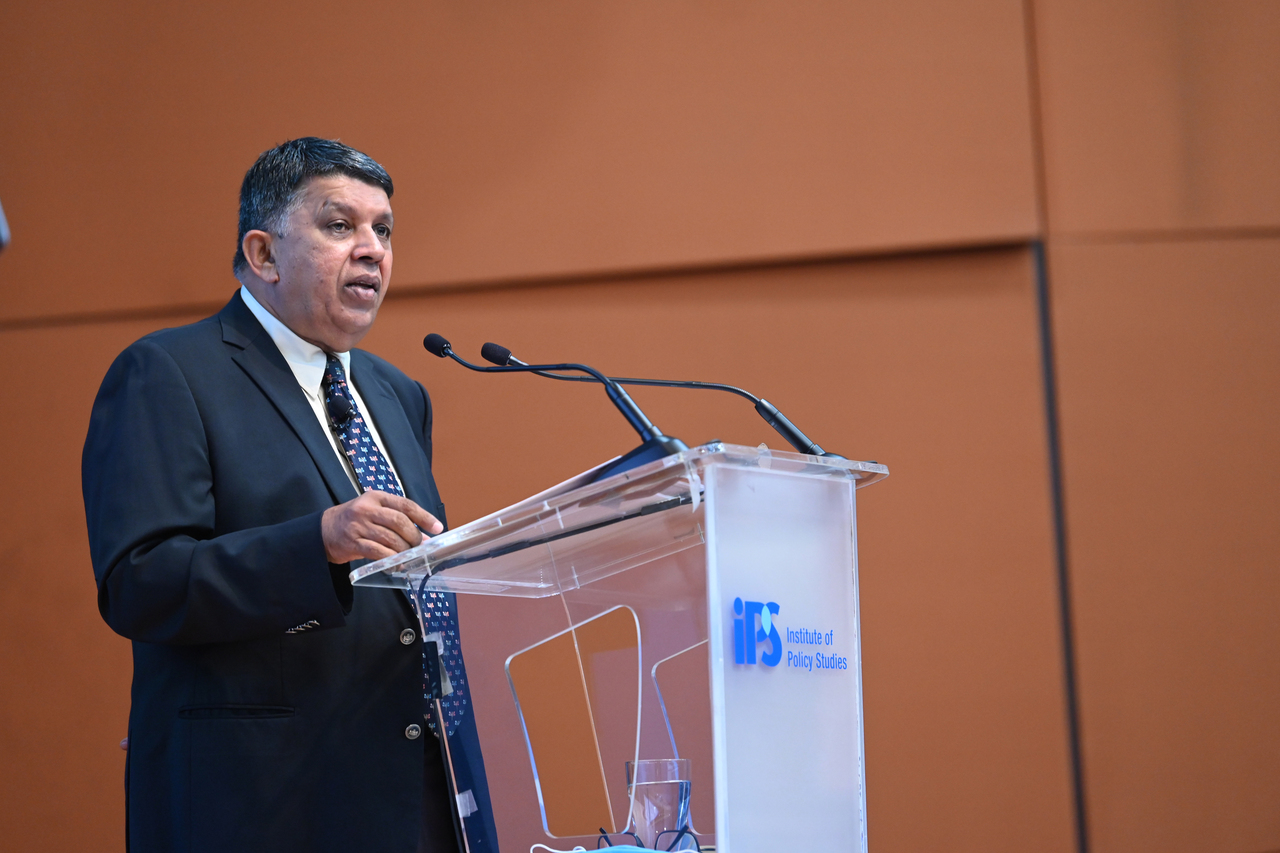Former interim CEO Patrick Daniel sets out what SPH Media Trust must do to be successful
Sign up now: Get ST's newsletters delivered to your inbox

Mr Patrick Daniel laid out his vision for SPH Media Trust in a lecture on March 14, 2022.
PHOTO: JACKY HO FOR THE INSTITUTE OF POLICY STUDIES
SINGAPORE - By 2045, SPH Media Trust (SMT) could be a financially independent, thriving media group with products in four languages that are trusted by audiences who pay for premium content, both in Singapore and abroad, said SMT director and former interim chief executive Patrick Daniel.
To achieve this goal, SMT will need forward-looking policies focused on talent acquisition, retention and employee engagement, as well as continuous investments in technology, he said in a lecture laying out his vision for the company.
"Greater use of data and artificial intelligence (AI), already employed in newsrooms elsewhere, must drive innovations," said Mr Daniel on Monday (March 14).
"This is where SMT can make the biggest leap, and where government funding must be put to good effect."
Mr Daniel was delivering his third lecture on the topic, Stewardship Of The Singapore Media: Staying The Course, as the Institute of Policy Studies' (IPS) 11th S R Nathan Fellow for the Study of Singapore. The lecture was live-streamed on the IPS Facebook page.
SMT must also scale up subscription sales, he said, adding: "Subscription revenues must make a significant contribution to SMT revenues. More attention must also be paid to satisfying customers."
In addition, the company must find new strategies to turn the decline in advertising revenue around, gain broader community support for its mission of providing trusted news as a public good, and make targeted investments in other media-related businesses to generate new streams of revenue, he said.
Mr Daniel, who was editor-in-chief of Singapore Press Holdings' English/Malay/Tamil Division from 2007 to 2016 and former deputy chief executive of SPH, said he was confident that SMT would be able to achieve its goal of being financially independent if given resources.
He cited two recent surveys by the Nanyang Technological University's Wee Kim Wee School of Communication and Information and the Reuters Institute for the Study of Journalism, which he said showed strong interest in news and readership in Singapore as well as high levels of trust in local media.
"I believe SMT can build on this and grow," Mr Daniel said.
In his speech, he also outlined what a "feasible, desired future" for the local media landscape in general would look like in 2045.
"There are good audiences in English and Mandarin for high-quality, trusted news content, both in written and audio-visual forms. For Malay and Tamil, there are smaller but loyal audiences," he said. "Niche content on other topics, everything from politics to food, also have decent audiences."
Content would be delivered largely on digital formats, with the print format delivered as e-papers on tablets. There would also be more players in local journalism than before, mostly in niche spaces, and a myriad of other sources of news online.
Against this backdrop, Mr Daniel detailed how SMT's future should look in 2045.
He said SMT would distinguish its offerings from others through the quality of its content, with a key differentiator being the trust it would have gained from users over the years through accuracy and balanced coverage.
Strong SMT newsrooms, well supported by technology and AI, would produce compelling content. And SMT's regional and international paid reach would have grown, after years of strong subscription campaigns.
As for SMT's vernacular offerings, Mr Daniel said the Chinese-language Lianhe Zaobao would have wide reach both in China and among the Chinese diaspora outside China. Meanwhile, SMT's Malay and Tamil papers, having invested in stronger newsrooms, would be alive and well, supported partly by benefactors.
Mr Daniel also outlined a desired future for Singapore in other areas besides media, including social issues.
He noted that the divisions of race, language and religion were pressing concerns when the national pledge was drafted shortly after Singapore's independence, but there are now many more differences in society.
The pledge should be modified to take into account new priorities and challenges, Mr Daniel said.
He cited differing perspectives between new citizens and those born here, Singapore's increasing political diversity, and sexual orientation and gender identity, adding that these other differences will need to be part of any new formulation of the concept of "one united people".
More focus should be placed on ensuring social mobility and more equal outcomes, Mr Daniel added.
He suggested that the Workfare Income Supplement scheme, under which the Government tops up the monthly salaries of low-wage workers, should be tied to taxes that target wealth, so that Singaporeans can see wealth being redistributed in a purposeful way.
Mr Daniel also touched on other emerging challenges facing Singapore, such as the climate crisis and technological disruptions like AI and the metaverse, adding that the country should embrace the opportunities brought about by these challenges.


